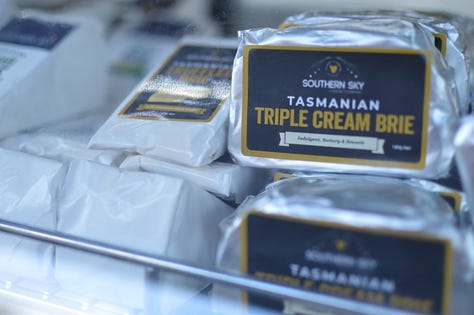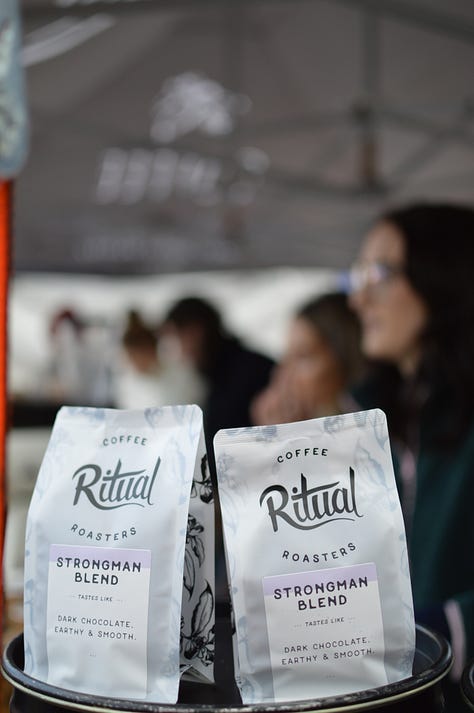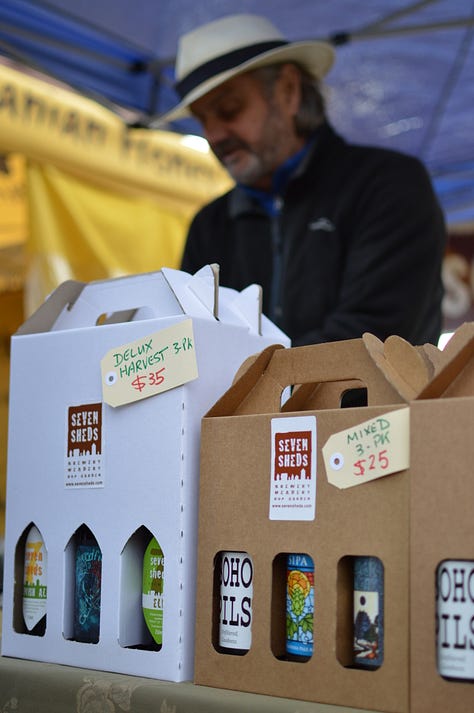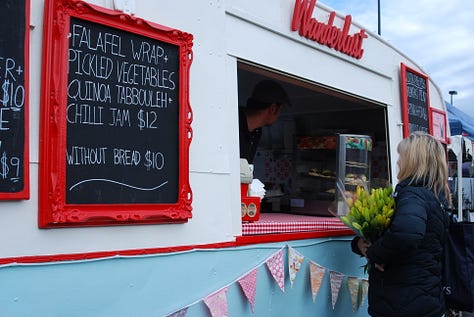Saturday notebook - Harvest Market Launceston
For five years I had a stall at Harvest Market Launceston. We raised our kids there. Other kids learn how to go into a sweet shop for themselves, mine learned to queue at Sandy’s Sourdough for a chocolate doughnut. My son brought his scooter with him and learned his way to the park, crossing roads on his own. My daughter stayed home alone when she was old enough.
It’s been four years since we wound up our business and stopped being stallholders there. It was just before covid, so we’ve had a pandemic and then recovery from that, new jobs, the coming of middle and older age. Shifting sands, expanding waistlines.
You make a lot of friends in five years and I’ve missed them, the camaraderie and seeing the same folk through the seasons. So on Saturday I went back as a volunteer. I did a ninety minute shift as a ‘market rover’ which means you fill in wherever is necessary. I was on the bins. Waste is a big deal at the market. Food is eaten, coffee is drunk and the containers, forks, cups, miniature sauce bowls serviettes and leftovers have to go somewhere.
Harvest has five bins which are collected by a private processor at the end of the market. Coffee cups and white cardboard and polystyrene are separated out and go to landfill as nothing can be done with them. Brown cardboard food boxes and clear biodegradables go to compost. Clear plastic and wooden cutlery go to general recycling.
For an hour I helped people sort their remainders and forks and compostables and fished things out with a long pair of tongs if they went in the wrong bin. Many people thanked me. One surprising chap just threw an armful of stuff into the first bin he saw. Another donated his Amazon packaging box which he sure didn’t get from any Harvest stallholder!
During the time we had a stall there, I often got called ‘the pig lady’ sometimes to my face. (We raised Wessex Saddleback pigs and took a range of beautiful, heritage pork products to market.) Yesterday I got called ‘the bin lady’. Even so, I was glad to do it. I agonise over waste in my kitchen and we have a compost bin, a goat bin, a recycling bin and a landfill bin. We should all be thinking about where our waste is going so I was happy to upscale.
Since everyone generates waste, you see a lot of people when you’re on bin detail. Within the first fifteen minutes I’d caught up with the honey lady from Honey Tasmania who is now a very funky grandmother and the salmon farmer from 41 South Salmon who’s now a builder. The Delicious Little Things lady looked not a moment older, a testimony to the youth-giving powers of macaroons. Willie the brewer and former beer writer from Seven Sheds who keeps a weathered eye on the press and their inaccuracies rushed over to share their latest transgression, the description of a person being ‘rushed to hospital’.
‘When does that ever happen?’ he demanded. I quite took his point. It should just say ‘was taken’ we agreed.
‘Over a couple of days,’ I added, and we laughed, the hops tucked into his hat quivering in mirth and indignation.
The inevitability of change can be seen at the market after a gap. Covid and the recently built hotel next door which puts it literally in the shade, the shifts and shadows visible in the faces of friends as we get older, wiser and the accumulated experiences of life are sent to test us. Just as the stallholders operate from open marquees, the market is a place where everything is on view and nothing hidden. People exchange views and news freely and then move in for the warm, long, gripping hugs that make the hard things bearable.
At the end of my shift I spent my volunteer vouchers and then some more. I bought a vegetarian breakfast pie from the Wanderlust Food Van, and my dessert, a hot chocolate from the Ritual Coffee Roasters. I bought sprouts and green beans from Steve’s Vegies, truffled brie from Southern Sky Cheese Company, an almond croissant for my daughter.






You can spend fifty, one hundred bucks in the blink of an eye at the market. Then again, you can keep your purse in your pocket and just soak up the atmosphere, which costs not a penny. There aren’t many places we can go these days where something is available for nothing. But the market is free with its ambience and its joie de vivre and its joyful and consoling conversations. It has that in spades and it’s a rich store indeed.
If you’d like to read more about the life of an artisan farmer and stallholder at Harvest Market, you can find my book Saddleback Wife - Slow Food in Tasmania at select bookshops and giftshops in Tasmania, and on Amazon.






